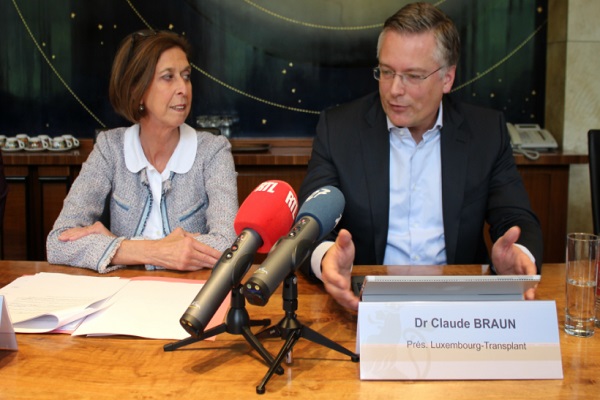 L-R: Lydia Mutsch, Minister of Health; Dr. Claude Braun, President of Luxembourg Transplant;
Credit: MSAN
L-R: Lydia Mutsch, Minister of Health; Dr. Claude Braun, President of Luxembourg Transplant;
Credit: MSAN
A survey from the Ministry of Health and the Luxembourg Transplant asbl has revealed that 82% of Luxembourgers are in favour of organ donation.
The results of the Quest representative survey of the resident population have shown that that the vast majority of respondents (82%) were very supportive of donating their own organs. Nevertheless, despite this favourable predisposition, the consent requested from a relative triggered a major hesitation for most respondents (58%). This result also reflects the findings from the field, with a family refusal rate of about 40 to 50%.
In any case, every resident of Luxembourg is a potential donor of organs, as Minister of Health Lydia Mutsch explained: "According to the 1982 law on the removal of organs and tissues, there is a presumption of solidarity: it is considered that everyone agrees to donate organs after death, if he has not explicitly expressed his refusal”. However, in practice, health professionals confronted with a potential donor always collect the consent of relatives or family of the deceased. This is a practice that, according to the Quest survey, leads to confusion with a majority of respondents (63%) admitting to not knowing the legal framework.
Among the eight member countries of Eurotransplant, an average of 15,000 people are on waiting lists every year to obtain a transplant, including about 65 in Luxembourg. For Lydia Mutsch, these disturbing results confirm the reflections and steps initiated within the ministry in recent months to improve the organ donation situation, including the creation of a national coordination service for organ donations.
Through an agreement recently signed with the Ministry, the non-profit organisation Luxembourg Transplant will now implement the National Coordination Service for Organ Donations. Its various missions are defined in a Grand-Ducal Regulation on the organisation and working methods of this national service. For instance, the convention covers, among other things, the costs related to staff made available to the national organ donation coordination service. These are referents within hospitals that have the mission of identifying potential organ donors, discussing the facts with relatives of the potential donor and linking the hospital and the national service. The referees are independent of Luxembourg Transplant.
In addition, the digitalisation of the health system, and in particular the shared care file (CSP), is an extra instrument that will allow each patient to make a decision about whether or not to donate organs. The testimony of his/her decision will facilitate the work of medical teams, considering that the transplant procedure is a race against the clock. It will thus relieve the relatives of a heavy emotional burden in a difficult and often unexpected situation.
In collaboration with Luxembourg Transplant, the Ministry of Health also launches an information and awareness campaign every year on the occasion of World Organ Donor Day. And the efforts are beginning to bear fruit: in 2017, Luxembourg was able to register 9 donors for the removal of 14 kidneys, 2 hearts, 6 lungs and 10 livers, which saved the lives of 32 patients.








